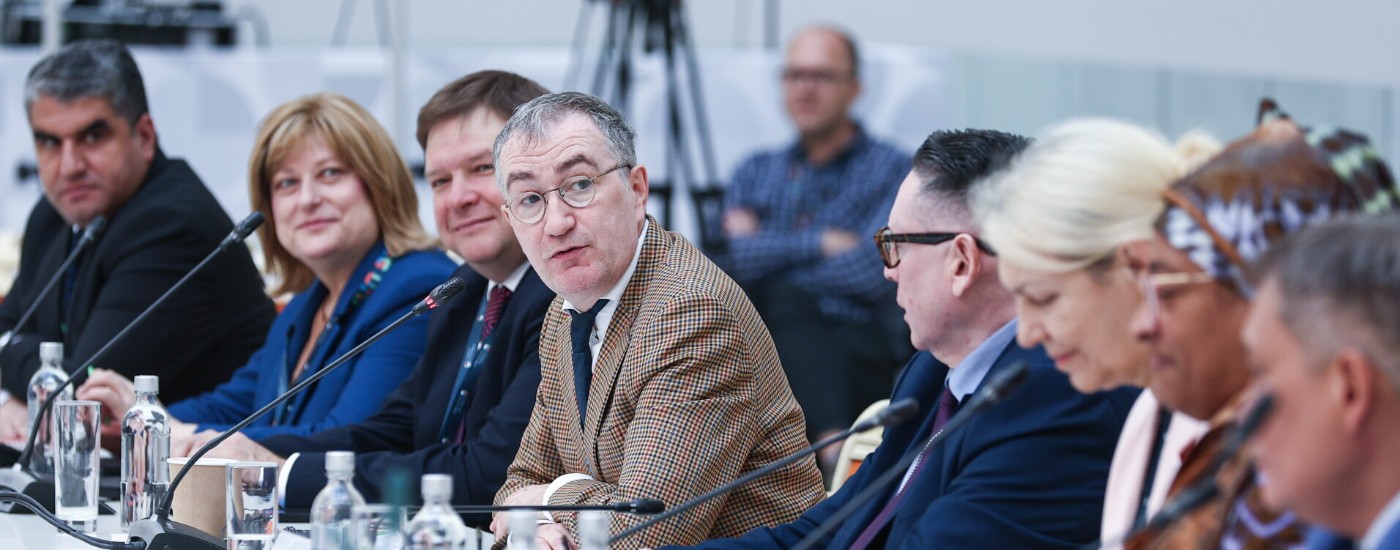On September 11 in St. Petersburg, at the XI St. Petersburg International United Cultures Forum, a panel discussion titled "Educational Institutions in Shaping the Global Cultural Space" took place. The discussion was part of the thematic section "Art Education," curated by Grigory Zaslavsky, Rector of the Russian Institute of Theatre Arts GITIS.
Participants in the panel included Manami Saito, President of the Board of Directors of the Japan Dance Research Academy; Evgeny Knyazev, Rector of the Shchukin Theater Institute; Alexey Vasiliev, Rector of the St. Petersburg Rimsky-Korsakov State Conservatory; Oumy Sene, Secretary General of the Russian Cultural Center Kalinka; Ergobek Kulbekuly, Vice Rector for Academic Affairs at the T. K. Zhurgenov Kazakh National Academy of Arts; Vincente Barrientos, President of the BRICS Center; Mahmoud Mirzo Nazarzoda, Rector of the Tajik Institute of Culture and Arts; Irakli Khintba, Director General of the F. A. Iskander State Russian Drama Theater; and Yaroslava Kabalevskaya, Assistant to the Rector of the Tchaikovsky Moscow State Conservatory.
Speakers examined the role of educational institutions in promoting national cultural traditions worldwide, addressed the internationalization of arts education with its pros and cons, and discussed sharing best practices among schools in different countries.
Before the discussion began, Grigory Zaslavsky emphasized the importance of the art education track: "I am very grateful to the Ministry of Culture of the Russian Federation for the fact that, for the first time this year, the United Cultures Forum includes a section on art education. For those of us who lead creative universities, this is recognition of the importance of art education within the broader system of culture and the arts. After all, any forum is a conversation about tomorrow, and if we talk about tomorrow without mentioning education, we will not understand what the future will be or who will shape it."
During the discussion, Alexey Vasiliev shared his view on how to forge the culture of the future: "For me the answer is obvious, we need to continue doing our work honestly and with enthusiasm. Creative enthusiasm is what will keep us at the forefront of global culture and make people in every country listen to us, absorb our culture, and, as a result, grow closer, since conflicts in the world arise solely from misunderstandings."
Speaking about the benefits of internationalization in the arts, Oumy Sene highlighted Russia's openness and willingness to help promote African culture: "Thank goodness we have Russia, because it is one of the countries that is ready to help give our art a place, to integrate our art as it is."
Vincente Barrientos presented a proposal aimed at strengthening ties between Latin America and Russia: "We want to create the first private Russian cultural center in Rio de Janeiro, Brazil, a hub that would connect not only with Brazil but with all of Latin America, since Rio de Janeiro has always been the cultural capital of the region. But after hearing representatives here from music schools, dance schools, theater schools, and film schools, I thought our vision might be too modest. We should not build only a Russian cultural center, we should create a Russian culture cluster to focus on the distribution and promotion of Russian culture."
The speakers agreed that art education is more relevant than ever. It is vital to treat traditions with care so that young talents have a successful future.






